Britain is maintaining ‘diplomatic contact’ with Syrian rebels who deposed dictator Bashar Al-Assad, says David Lammy
Britain has reached out to the Syrian rebels who toppled Bashir-al-Assad’s regime, David Lammy confirmed last night.
The Foreign Secretary said Britain has had “diplomatic contact” with the Hayat Tahrir al-Sham, which led this month’s overthrow of the Syrian president.
It comes after days of confusion over whether Britain can and should have meaningful contact with HTS while it remains a banned terrorist group.
But speaking to Sky News last night, Mr Lammy said: ‘HTS remains a banned organisation, but we can have diplomatic contact and so we have diplomatic contact as you would expect.’
On what should replace the Assad regime, he added: “We want to see a representative, an inclusive (new) government.
“We want chemical weapons stockpiles to be secured and not used, and we want to ensure that violence does not continue.
“And for all these reasons, using all the channels we have available, we try to engage with HTS where necessary.”
Asked whether Britain could soon remove them from the banned terror list, he said: ‘This was an organization that emerged from Al-Qaeda.
Syrians buy bread in the city of Douma on the outskirts of the capital Damascus on December 15, 2024
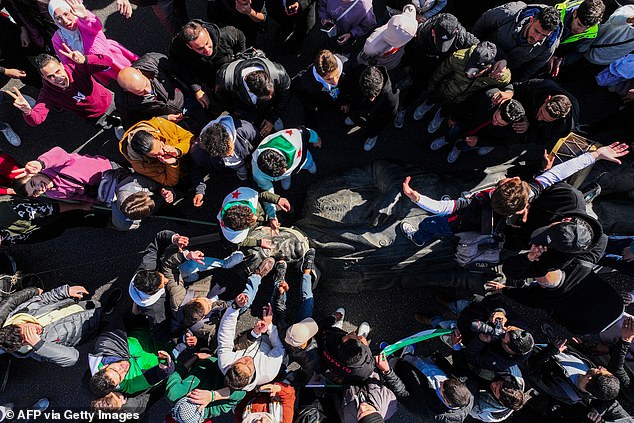
An aerial view shows protesters dragging a toppled statue of late President Hafez al-Assad across the street during a student rally near the campus of Damascus University in the Syrian capital on December 15, 2024
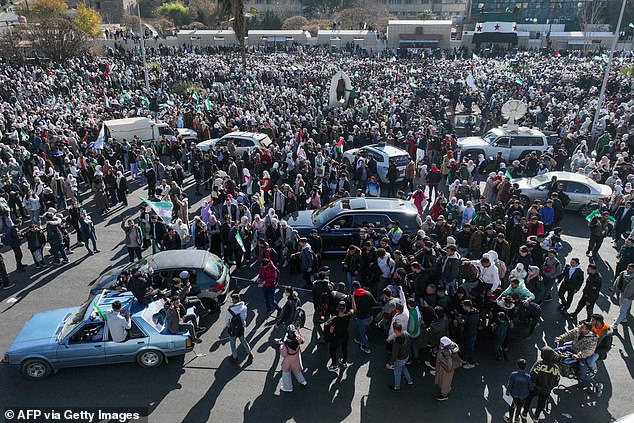
£30 million will be channeled inside Syria for food, shelter and emergency healthcare, while £10 million will go to the World Food Program (WFP) in Lebanon and £10 million to the WFP and the UN refugee agency.
Since then, Western governments have debated how to deal with HTS, a banned organization in Britain due to its close ties to Al Qaeda.
Current leader Ahmad al-Sharaa, who had used the alias Mohammed al-Golani before taking power, has tried to distance his movement from the terrorist group.
There are also concerns that a power vacuum in Syria could worsen regional tensions and create conditions in which the so-called Islamic State group could regain ground.
Foreign Secretary David Lammy said: ‘The fall of the horrific Assad regime offers the Syrian people a unique opportunity.
“We are committed to supporting the Syrian people as they chart a new course, first by providing £50 million of new food, healthcare and aid to support the humanitarian needs of vulnerable Syrians. Secondly, by working diplomatically towards better governance in Syria’s future.
‘This weekend Britain and its partners met to agree the principles needed to support a Syrian-led political transition process. It is crucial that the future Syrian government brings together all groups to achieve the stability and respect that the Syrian people deserve.”
Sir Keir Starmer told a virtual meeting of G7 leaders on Friday that “the fall of (Bashar) Assad’s brutal regime should be welcomed, but we must be careful about what comes next.”
In a statement on Thursday, the leaders said they were committed to “working with and fully supporting” a future Syrian government that agreed to “respect the rule of law, universal human rights, including women’s rights, the protection of all Syrians, to guarantee’. including religious and ethnic minorities, transparency and accountability’.
‘Al-Qaeda is responsible for a huge loss of life on British soil. We will judge them by their actions. I will not comment on future bans, but we of course recognize that this is an important moment for Syria.
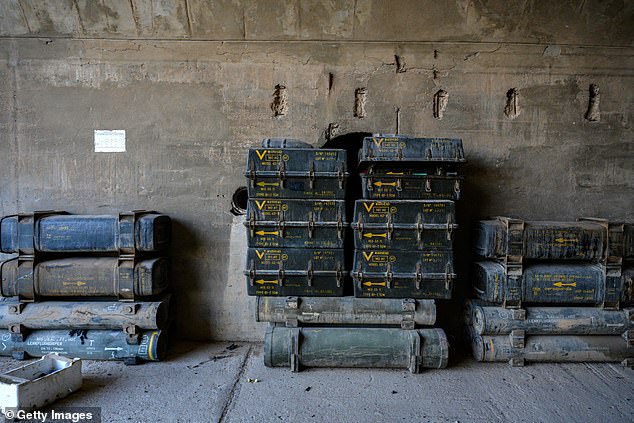
Syrian Air Force helicopter munitions (these boxes labeled nuclear warhead) and Russian-made missiles stored at the Mezzeh military airport near the capital remain untouched by more than 500 Israeli strikes on military targets across Syria since the fall of Assad regime on December 15. 2024 in Damascus, Syria
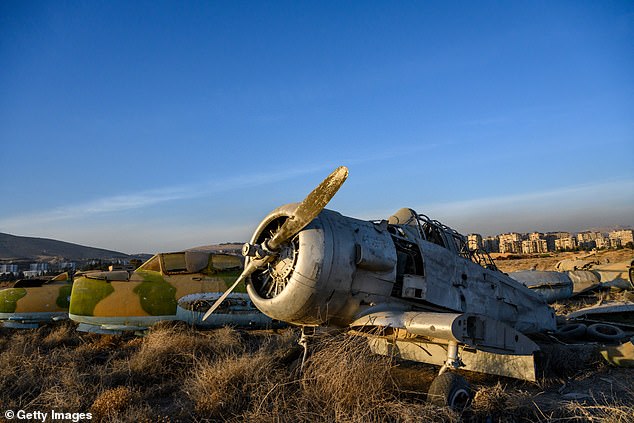
Discarded old Syrian Air Force planes are left next to the tarmac at Mezzeh military airport, as Israel carries out more than 500 Israeli strikes on military targets across Syria since the fall of the Assad regime, on December 15, 2024 in Damascus, Syria
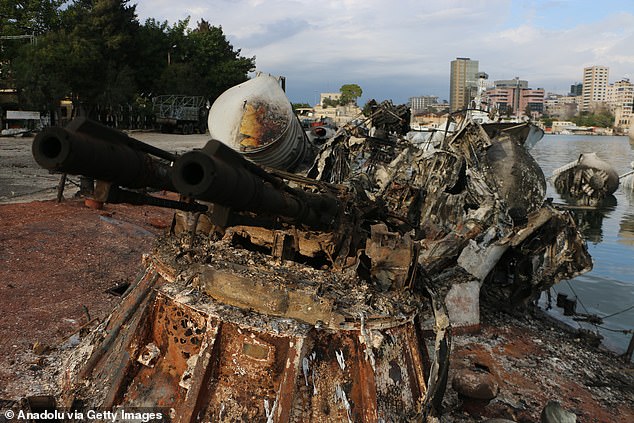
A view of the port of Latakia as the removal of the wreckage of Syrian naval vessels destroyed by Israeli airstrikes has been completed and the port will reopen for operations in Latakia, Syria on December 15, 2024
“There is tremendous hope on the streets of Syria… we endorse an inclusive opportunity that is Syrian-led and Syrian-owned.”
It comes after it emerged that the US was also in direct talks with HTS.
Antony Blinken, the US Secretary of State, said at the weekend after the talks that Syria’s new government must reject terrorism and destroy the former dictator’s stockpiles of chemical weapons.
It must also respect the rights of women and minorities, he said, adding that his message to the Syrian people was: “we want them to succeed and we are ready to help them do so.”
The rebel leaders of HTS, once part of Al Qaeda, say the group has broken with its extremist past.
It comes after Britain announced £50 million in humanitarian aid for vulnerable Syrians in the Middle East following the overthrow of Bashar Assad’s regime.
The emergency aid will be delivered through the UN and NGO agencies to people in the country, as well as to refugees in Lebanon and Jordan, the Foreign Ministry said.
Britain took part in the talks in Aqaba on Saturday, hosted by Jordan and attended by ministers and delegates from the US, France, Germany, the Arab Contact Group, Bahrain, Qatar, Turkey, the United Arab Emirates, the EU and the UN.
They agreed on the importance of a “non-sectarian and representative government” that protects human rights, unfettered humanitarian access, the safe destruction of chemical weapons and the fight against terrorism.
“The United Kingdom urges the transitional government to adhere to these principles to build a more hopeful, secure and peaceful Syria,” the Foreign Office said on Sunday.
Around £120,000 in UK funding has also been made available to the Organization for the Prohibition of Chemical Weapons (OPCW), the department said.
A further £30 million will be channeled within Syria for food, shelter and emergency healthcare, while £10 million will go to the World Food Program (WFP) in Lebanon and £10 million to the WFP and the UN refugee agency, UNHCR in Jordan.
The intervention comes a week after the collapse of the Assad regime following a lightning offensive by rebel group Hayat Tahrir al-Sham (HTS).
